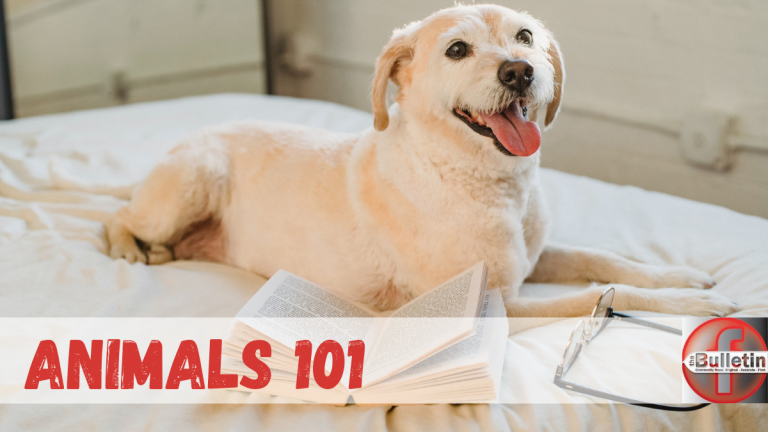
MANY ARE EXCITED ABOUT THE FESTIVITIES SURROUNDING THE CHRISTMAS HOLIDAYS, BUT FOR SOME, AFTER PET LOSS, IT IS A TIME THAT THEY DREAD.
With their shorter lifespans, pet loss is inevitable and saying goodbye is something every pet lover faces eventually. Saying goodbye is the hardest part of our relationships with our pets. As someone mentioned in a pet grief group, you joined a club you never wanted to be part of. Regardless of the type of pet, furry, finned, or scaled, no matter the species, we love them with all of our hearts and feel their loss as strongly as we’d feel the loss of a human family member or friend.
I am no grief expert and although I educate and read about pet grief a lot, you read the info with less emotions when it doesn’t affect you directly. Maybe it prepared me better for our recent unexpected situation, but the pain is still real and the loss is valid.
Grief is the response to loss and it is a strong, sometimes overwhelming emotion. It usually comes from the loss of a loved one, human, or animal to which a bond or affection was formed or it can come from a terminal diagnosis you or the someone you love receives. It doesn’t matter whether your pet died because of age, injury, or illness the death of a beloved pet is excruciating.
Although conventionally focused on the emotional response to loss, grief also has physical, cognitive, behavioural, social, cultural, spiritual and philosophical dimensions. Prolonged grief disorder is the newest disorder to be added to the Diagnostic and Statistical Manual of Mental Disorders (DSM). It is included in the text revision, which was released in March 2022. This is known also as complicated grief, sometimes called persistent complex bereavement disorder.
Also read Holiday safety tips for pet owners.
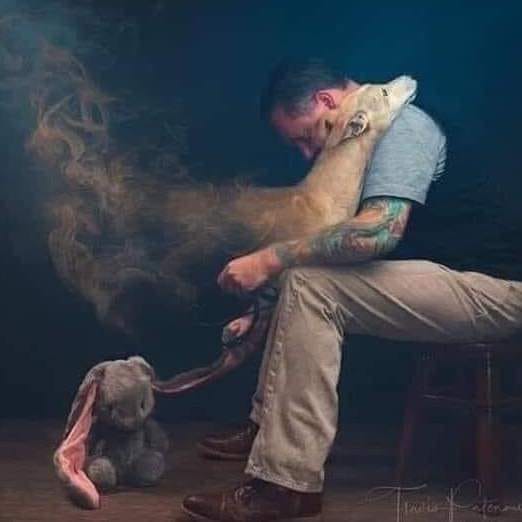
A FEW THINGS TO KEEP IN MIND
- Your grief is valid, individual and personal.
- Don’t be afraid to reach out for support. There are professional counselors for those who have lost pets.
- Ensure all your family members are supported and understand that all might not experience it in the same way.
- Make sure your other pets are ok as animals grieve too.
- Other people, especially those without pets, don’t realize that the experience can be just as traumatic as losing a parent or child.
- A physical memorial can provide comfort.
- Don’t make any big or quick decisions like getting a new pet during this time.
WHY DOES PET LOSS HURT?
There may be many reasons but some of the major reasons are certainly because animals’ love is so unconditional, non-judgemental and accepting. They have seen you at your best and your worst. Sometimes these pets have helped us through major life-changing events like losing someone, illness, a new job or new school, divorce, etc. Grief is a sign you were loved and loved deeply.
I watched a TEDx talk by an emergency vet Dr. Sarah Hoggan and this is some of what she shared:
The emotions you experience are real because the emotions you experienced with your pet was real. The loss is valid because you didn’t lose a thing you lost someone close and special to you.
Why is pet loss different from human loss?
- Society does tend to diminish the validity of pet loss. Our pets make us happy so losing them will have the opposite effect and break our hearts.
- The relationship is different. The unconditional love of the human-animal bond. They don’t judge and being able to be yourself with someone, is a deep connection.
- Many people confess how bad they feel that they cried more when their pet died than maybe a parent. Your mom that died could tell you that she is in pain, had a good life or express that she wants to go and although we might get that from our pets in a way, they can’t tell us that in words.
Comorbidities of grief
She refers to the factors that made your relationship special as comorbidities of the grief and these comorbidities makes the grief more complicated. Here are a few:
- The fact that you had to make a euthanasia (PTS) decision or lost your pet due to a preventable accident or unexpectedly.
- If it was a rescue. A broken soul that learned to trust again because of you. Remember that your first rescue brought them joy, and your final rescue (PTS) brought them peace.
- If they rescued you in some way – reaching out for a hand and finding a paw.
- Losing a pet that is more than a pet for example, a therapy or emotional support companion.
- If you lost a pet that was a living link to someone you lost before. Losing the pet makes you feel like losing them all over again.
STAGES OF GRIEF
As I mentioned grief is personal. We can’t say it has to take you this or that long or you need to do this or that. Do what works for you., just don’t get stuck in some phases like guilt or depression. Typically, there are five stages of grief, but before the actual grief after a death, you will experience what is referred to as anticipatory grief.
Anticipatory grief is normal, but it may rob you of day-to-day joy and time with your pet if you don’t know how to manage it. So how can you cope with this anticipatory grief feeling? By staying present and connected. Pets help us stay in the moment, appreciating every second we’re together. “If we can learn to stay present, that’s where the healing begins and not only the healing of grief but the preservation of our connection with our pets.” – Nancy Gordon
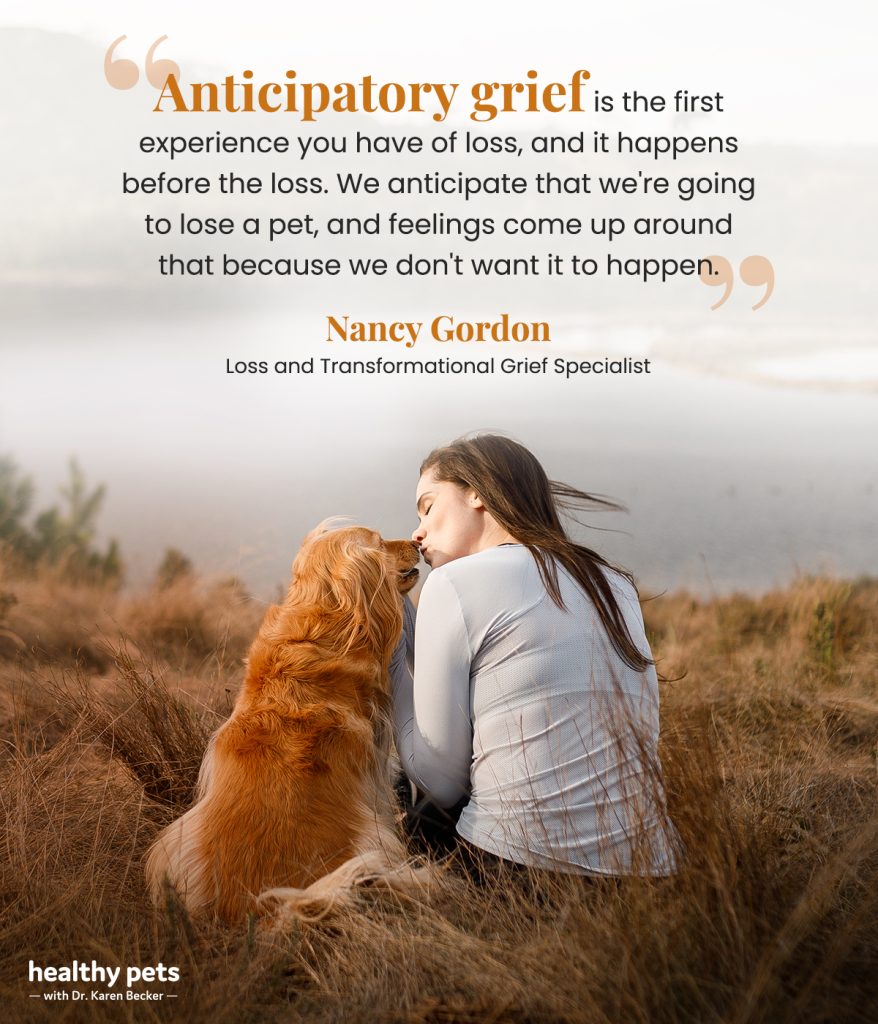
5 STAGES
In an article by WHOLE DOG JOURNAL, Author Pat Miller shared the 5 stages of grief as well as a visualization exercise for grieving.
The “five stages of grief” concepts have been applied by healthcare professionals to anyone suffering the loss of something of vital importance which includes our beloved animal companions. Because grief is such an individual process, not everyone may experience all five stages and it might also not be in this particular order, however, our first response to the loss is usually denial and the last acceptance.
1. Denial
This can be with the diagnosis or after the death.
2. Anger/Blame/Guilt
The guilt, especially if the death was due to a preventable accident or a euthanasia decision, will be there. Whether you waited too long or opted for euthanasia too early or if your pet died at home, you will have to deal with feelings of guilt. I have experienced the guilt of too late and too early PTS and I can assure you the one if you wait too long is worse. You will also feel guilty for being happy on some days.
3. Bargaining
This includes all the “what if’s”. Especially because of a disease diagnosis, I found this stage hard.
4. Depression
It is ok to cry and do it as often as you need. Some days the tears will be few and other days they will overwhelm you out of nowhere. Here are some tips to help you on those depression days. Breathing exercises can also help. The Calm page on Facebook has some great versions for breathing.
5. Acceptance
In time, the sadness will increasingly be replaced with happy memories of the times you and your pet spent together. The sadness may never go away completely, but it will become more bearable and less overwhelming.
Once you reach the stage of acceptance and you are back in a positive place, the best tribute you can pay to a dog that’s passed is to give another dog a second chance by adopting from a reputable rescue organisation.
David Kessler wrote a book in which he refers to the sixth stage of grief: Finding meaning again. In his book, Kessler gives readers a roadmap to remembering those who have died with more love than pain; he shows us how to move forward in a way that honors our loved ones. Adoption can be part of this.
My heart physically felt empty after the loss and this exercise helps.
VISIULISATION EXERCISE
In a quiet darkened room with gentle music and soft lighting, perhaps candles, make yourself comfortable on soft cushions, breathe, and relax. Close your eyes, and imagine yourself in a peaceful place – perhaps a sunny meadow, or a quiet wood next to a trickling stream. Breathe.
Now imagine your dog appearing at the edge of the meadow and running happily to you. You greet her joyfully, and the two of you spend many minutes together, remembering
happy times together.
When it’s time to go, you reach down and put your hands against her sides. As you watch, she becomes smaller and smaller, until she is small enough that you can pick her up, cupped in your hands. Now pick her up, hold her in your hands, and place her in your heart, where she will stay with you, forever.
Forgive yourself. You did the best you could and animals are very forgiving. Your pet would want you to laugh and enjoy and give a home to others. I don’t think animals fear death……they live in the now and by staying in the present and connected, our healing begins too.
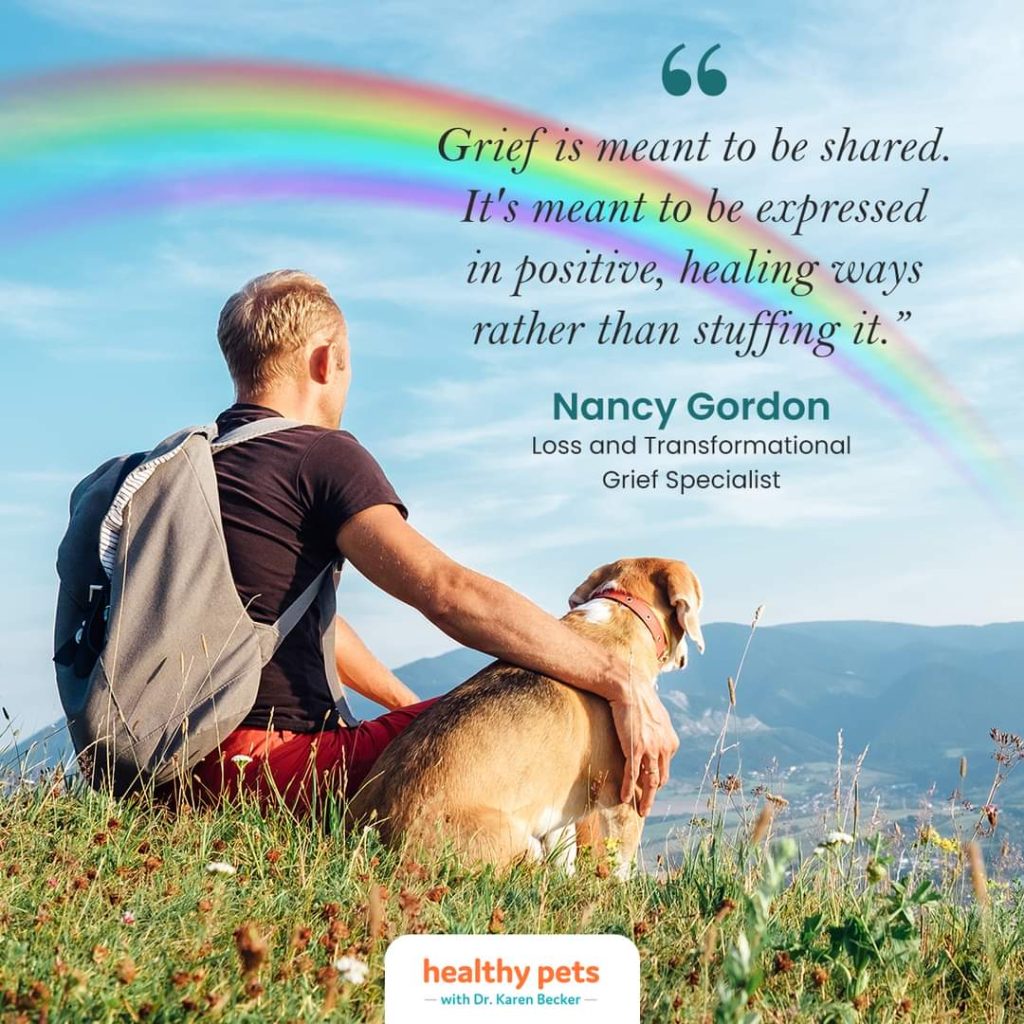
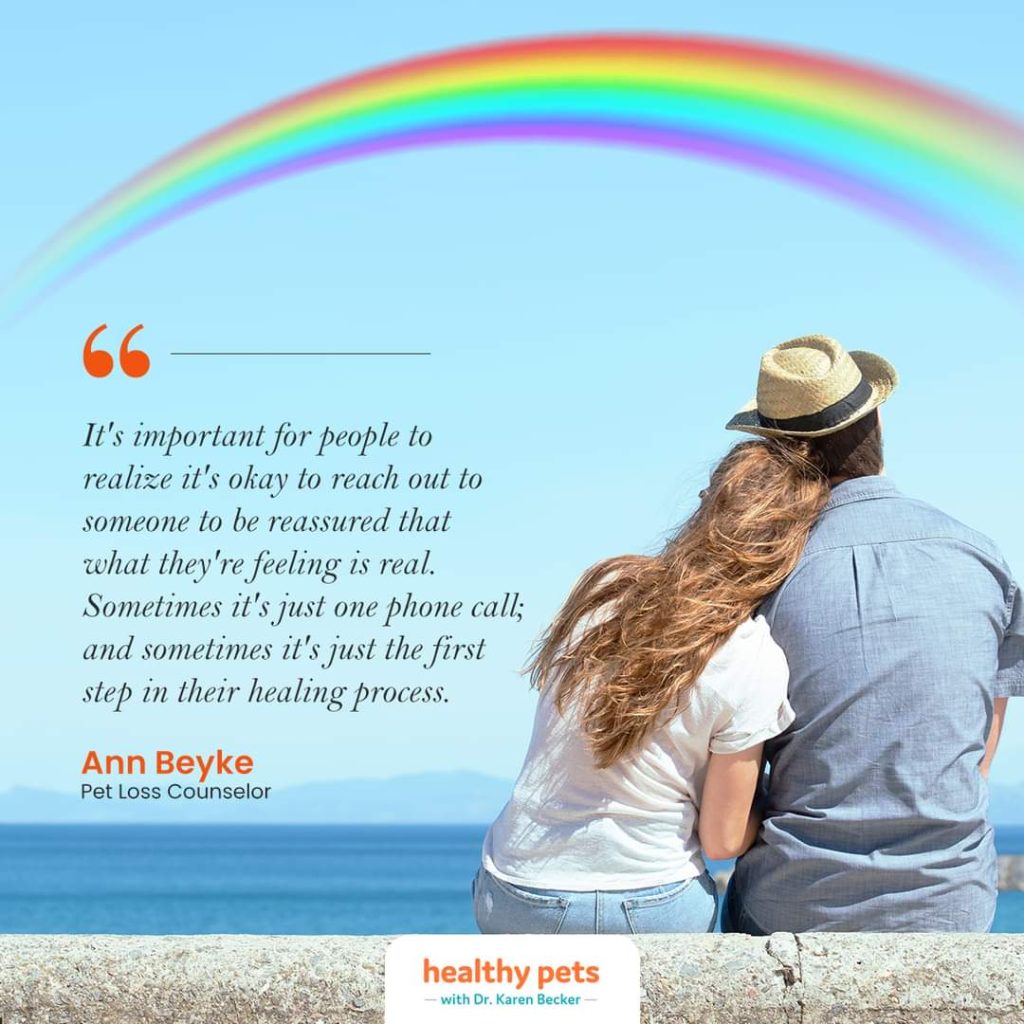
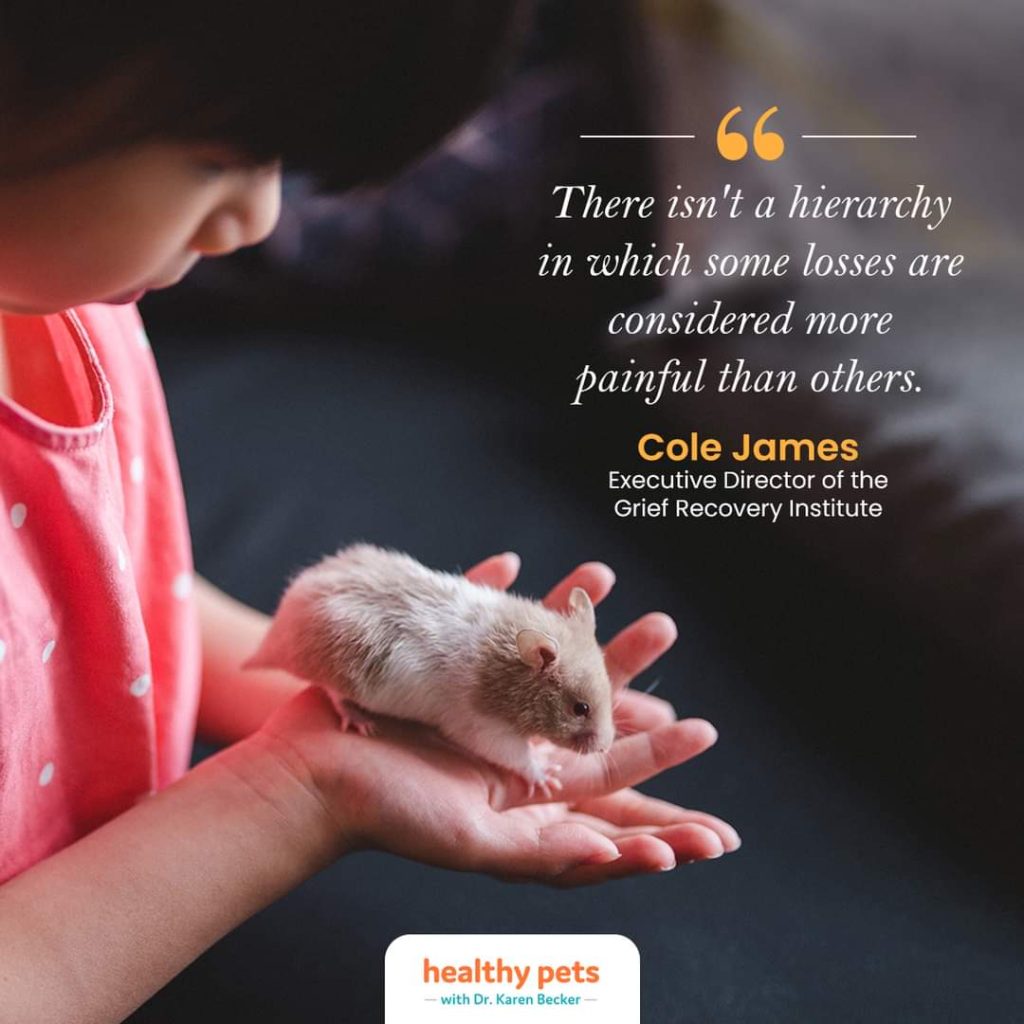
RAINBOW BRIDGE PREPARATION & GRIEF GUIDE
THE HARDEST DECISION I EVER MADE
To make it through the process of having your pet put to sleep (PTS/euthanasia), you need to begin preparing ahead of time. It is a crappy and hard decision, but I will always support “rather a month too soon than a day too late”! If your pet no longer enjoys the things they loved so much, then you are at that point. It happens in a grey area because if we wait until it is black and white it is too late. It is about quality of life because there is a difference between “existing” and “living”. If we extend this time, it is for us and not for them and that is selfish.
With sick or very old animals, we tend to hover over them. In an article by a vet, she shares how some animals in the wild, will leave the herd and go to die alone. You might have heard about or experienced a pet death, just the moment you were out or turned for a minute and this phenomenon could explain it. Humans usually don’t want to die alone, so we tend to think that animals don’t want to either. Maybe we prolong their suffering longer if we do this, but I totally get why we do. In all honesty, without trying to add to your guilt, I do think that if you are at that point, you already waited too long.
Please stay with them in those last moments. I couldn’t with the first dog but did with our recent loss and I will always opt to stay with them. It is the last gift you can give and I believe that at that moment, what is best for them, should trump our emotions about it. It gives some closure, plus the guilt of not being there is worse. I am thankful for the peaceful experience at Evander Dierekliniek with Dr. Melinda.
Read more on preparing for the practical side of euthanasia. You can also find links to quality-of-life questionnaires there.
OTHER RESOURCES
- for coping with the loss.
- Navigating the Journey of the Rainbow Bridge.
- Helping your other pets cope with loss.
- Ways in which to remember your pets.
There are many support groups online and it does help to be with people who understand and support you. Here are two of them:
- Marin Humane organization also offers a free, monthly support group (now via Zoom) for those who’ve lost pets. To learn more, go to marinhumane.org/get-involved/events. There are also many other support groups for individuals who lost pets.
Books
- Pet Loss: A Thoughtful Guide for Adults and Children, by Herbert A Nieburg and Arlene Fischer
- I Heard Your Dog Died: Imaginings for Those Who Have Lost a Pet, by Bonnie Kreitler
- The Loss of a Pet: A Guide to Coping with the Grieving Process When a Pet Dies, by Wallace Sife
- Coping With Sorrow on the Loss of Your Pet, by Moira Anderson Allen
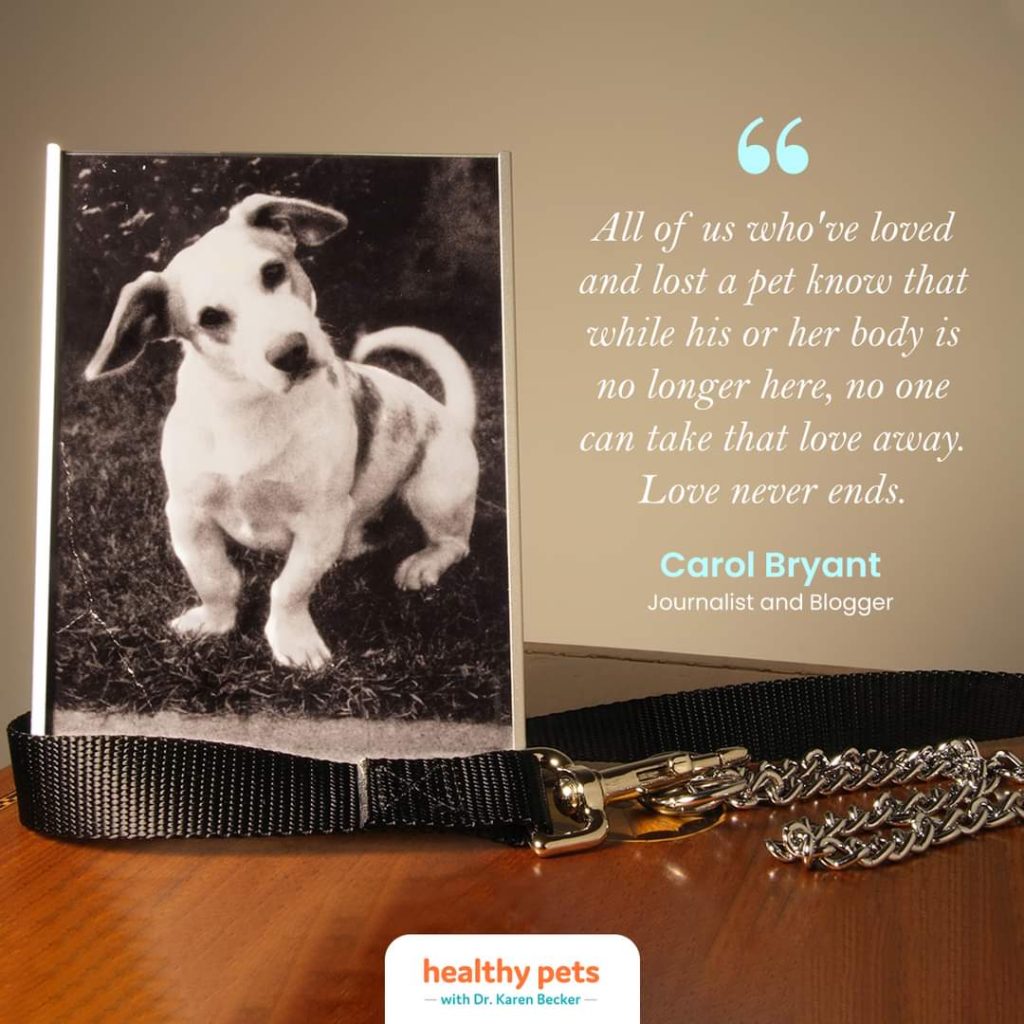
Please don’t get a new pet when you are still going through the grieving stages because you will bring the new pet into a weak and sad energy, which is not fair to them. I wouldn’t suggest getting a pet that looks the same or giving them the same name. Never do it with a mindset of “replacing” your pet or to fill that void in your heart. They can’t be replaced and won’t fill that void! Also don’t feel guilty about loving another pet again.
Never let the animal suffer because you do not have the funds to euthanize them. Contact your local SPCA or animal rescue as there are ways they can help with this or talk to your veterinarian.
People tend to say that time will heal but I don’t believe time can heal. In time, to protect our sanity, I think the wound does close and is covered with scar tissue, the pain lessens or might be gone, but the scar (the sadness or reminder of it) may remain. We don’t need healing from grief, but from the pain that accompanies it. Actively working through the pain and staying present can bring healing. Hopefully in time the grief doesn’t consume us anymore or becomes less overwhelming, but time won’t change the fact that you need to grieve. You need to experience those emotion and take or make time to grieve.
Also, read what to do if your pet dies at home. Here is a nice video on the reunion at the rainbow bridge. Please be kind to those in animal welfare because we cry for other people’s pets too and many in the trenches experience this loss frequently.
My heart goes out to every person having to make a euthanasia (PTS) decision or who lost their beloved fur-family members. Death leaves a heartache no one can heal; love leaves a memory no one can steal – Cardinal Cottage
WHEN YOU KNOW BETTER, DO BETTER!